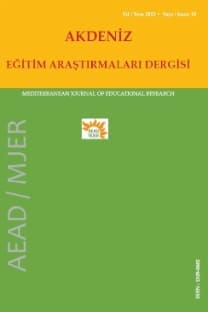Attainment of cultural capital in higher education the case of Turkey
Anahtar Kelimeler:
Türkiye
The problem set forth in this study is to determine if the Cultural Mobility Theory or the Cultural Reproduction Theory functions in the Turkish higher-education system. It has long been believed in Turkey that a college education is the key for cultural, social, and economic mobility. Researchers who have studied cultural capital found that, regardless of gender, a student's cultural capital has a significant effect on their decision to enter higher education and complete it.This study aims to find out the impact of the mothers' and the fathers' cultural capitals on students' early (before entering college) and late (after entering college) attainment when family background was controlled. Moreover, it investigates if the college environment acts as an agent to increase cultural capital depending on the location of the college campuses. The main finding of this study is the substantially large effect of cultural capital gain before college over cultural capital attainment during higher education, and that the most important predictor of late cultural attainment is the cultural attainment of students before entering college. On the other hand, students' early cultural capital gain is predicted by the mother's education, family income, and access to private art tutoring before college. Another important predictor of early cultural capital gain that should be noted is that receiving help from teachers on their schoolwork increases students' early cultural capital gain.
Keywords:
Turkey,
___
Aschaffenburg, K. and Maas,I. (1997) Cultural and educational careers: the dynamics of social reproduction, American Sociological Review, v62, p.573-587Barone, C. (2006) Cultural capital, ambition and the explanation of inequalities in learning outcome:a comparative analysis, Sociology, v40, pl039-1058
Blasko, Z. (2003) Cultural reproduction or cultural mobility? Review of Sociology, v9, p 5-26
Bourdieu, P. (1986) The forms of capital, In J.Richarson (Ed) Handbook of Theory and Research for the Sociology of Education, (p 241-258) Westport, CT Greenwood Press
Coleman ,]., C. (1988) Social capital in the creation of human capital, American Journal of Sociology, v94, p95-120
De Graaf, A.D., P., M. De Graaf and G. Kraaykamp, (2000), Parental cultural capital and educational attainment in the Netherlands: a refinement of the cultural capital perspective, Sociology of Education, v73, p 92-111
DiMaggio, P. (1982) Cultural capital and school success: the impact of status culture participation the grades of U.S high school students, American Sociological Review, v47, pl89-201
DiMaggio, P., J. Mohr (1985) Cultural capital, educational attainment, and marital selection, American Journal of Sociology, v90, n6, pl231-1261
Dumais, S., A. 2002) Cultural capital, gender, and school success: the role of habitus, Sociology of Education, v75, p44-68
Guncer, B. (1992) Academic orientations of Turkish students by socioeconomic status, International Education, v22, p56-66
Katsillis, J. ; R. Rubinson, (1990) Cultural capital, student achievement, and educational reproduction: the case of Greece, American Sociological Review, v55, p 270-279
Kalmijn,M. and Kraaykamp, G. (1996) Race, cultural capital, and schooling: an analysis of trend in the United States, Sociology of Education, v69, p.22-34
Tansel, A. (2002) Determinants of school attainment of boys and girls in Turkey: individual, household and community factors, Economics of Education Review, v21,n5 p 455-470
Tansel, A. (1994) Wage employment, earning and returns to schooling for man and women in Turkey, Economics of Education Review, vl3, n4, p 305-320
Sullivan, A. (2001) Cultural capital and educational attainment, Sociology, v35, p893-912
Zweigenhaft, R. (1993), Prep school and public school graduates of Harvard, Journal of Higher Education, v64, n2
- ISSN: 1309-0682
- Yayın Aralığı: Yılda 4 Sayı
- Başlangıç: 2008
- Yayıncı: Tayfun Taşbilek
Sayıdaki Diğer Makaleler
Müzik eğitiminin 3-6 yaş çocuğunun gelişiminde özerk olma sürecindeki işlevi
Devlet okullarında stratejik planlama ve yönetim:KKTC örneği
Zehra A. GAZİ, Fahriye A. AKSAL, Hüseyin ARASLI, Mustafa GAZİ, Aytekin İŞMAN
A comparison on school cultures of Turkey, Greece, North and South Cyprus
ALİ EKBER ŞAHİN, Fatoş SİLMAN, İçim ÖZENLİ
Attainment of cultural capital in higher education the case of Turkey
Arfe ÖZCAN YÜCEDAĞ, Özgür BAKER ERDUR
